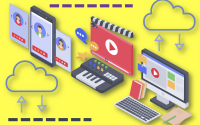
ProctorU Proposes Student Bill of Rights for Remote Learning
Doing school work remotely presents some unique challenges. For one, teachers can’t necessarily see how a student is accomplishing class work and may therefore make faulty assumptions about how it was done; and two, the education technology that facilitates online learning collects data on the student and the interactions, frequently without the student even knowing, […]
















